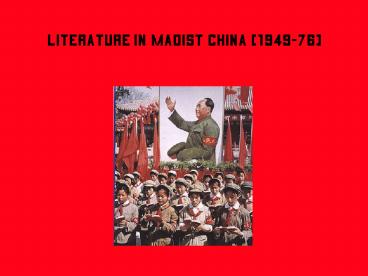Literature in Maoist China 194976 - PowerPoint PPT Presentation
1 / 16
Title:
Literature in Maoist China 194976
Description:
the formation of a national network of Xinhua bookstores distributed all books ... Little Red Book (below) 'The East is Red' (Dongfang hong ??? ) Mao buttons ... – PowerPoint PPT presentation
Number of Views:121
Avg rating:3.0/5.0
Title: Literature in Maoist China 194976
1
Literature in Maoist China (1949-76)
2
Founding of the PRC
"We the 475 million Chinese people have now stood
up and the future of our nation is infinitely
bright." --Mao Zedong.
- After, the War of Resistance, a long civil war
with the Nationalists (1946-49), who fled to
Taiwan - Founding of the PRC on Oct. 1, 1949
3
Socialization of the Economy
- Nationalization of industry
- Collectivization of agriculture
4
Cultural Sphere
- Mass culture and nation-building
- Party control was a process of tightening and
loosening - Yanan Legacy
- establishment of cultural institutions (Chinese
Writers Association), controlled by the Party,
to which you had to belong if you want to publish - Nationalization of the publishing and
distribution system - the formation of a national network of Xinhua
bookstores distributed all books - literary and intellectual campaigns (e.g.,
campaign against Hu Shi, Hu Feng)
5
Hundred Flowers and Anti-Rights Campaigns
- Hundred Flowers Campaign (1956-57) launched by
Mao in 1956 to let a hundred flowers blossom, a
hundred schools of thought contend - Writers respond with a return to May Fourth style
critical realism - Anti-Rightist Campaign (1957) aimed to attack
rightist elements Mao claims that 10 of the
population are rightists - Several hundred thousand attacked
6
Literary Production in the Early Maoist period
- Unease of writers in adjusting to the new regime
and its ideological demands - Censorship and self-censorship
- Eulogies to the new regime
- Stories of consciousness raising (e.g., Li Zhuns
?? Dont Go That Road ?????) - Writing the revolutionary past (e.g., Red Crag ??)
Officer Waterif you dont speak, well stick
them in again, all 10 fingers. Sister Jiang Go
ahead, theyre made of bamboo, but the will of a
communist is made of steel. Officer Ill break
your will Jiang You can cut off my head, and my
blood can flow, but a communists will cant be
broken.
7
Literary Production in the Early Maoist period
- Revolutionary realism and revolutionary
romanticism (e..g. Yang Mo, Song of Youth) - also a consciousness raising text
- story follows Lin Daojings maturation from a
lonely and romantic young woman into a mature
revolutionary its a novel about transcending
her bourgeois background and embracing the
revolutionary consciousness of the masses
8
Cultural Revolution Political Origins
- Struggle between two factions (pragmatists and
radical lefts or Maoists) during 1950s and 60s - Pragmatists Deng Xiaoping (right) and Liu Shaoqi
(next to Mao, below)
9
Cultural Revolution Political Origins
- Great Leap Forward (1958-61) and the failure of
the Maoist vision ends in horrible famine - Mao retreats from politics in 1962
- The CR was thus Maos attempt to reassert himself
in a political reaction against the emerging
power of the pragmatists over policy and
bureaucracy
Right Great Leap Forward poster Beat the GLF
war drum even louder
10
Cultural Revolution Ideological Origins
- Logical implementation of Maos long held ideas
on permanent revolution - idealist reaction to bureaucratism, top-heavy
party structures out of touch with the people - desire to implement a kind of mass-line democracy
- idealist egalitarianism and socialist utopia
Each Generation is Red, CR poster
11
Cultural Revolution Cultural Origins
- to bring an end to bourgeois and feudal culture
and institute and new culture of the workers,
peasants, and soldiers - Attack on the four olds and radical iconoclasm
- May Fourth writers attacked
Red Guards burn books (left) black elements at
a struggle session in Harbin (above)
12
Cultural Revolution Cult of Personality
- Cult of personality and ideological correctness
- Little Red Book (below)
- The East is Red (Dongfang hong ??? )
- Mao buttons (lower right)
13
Cultural Revolution Development
- Mao reasserts himself
- Student movement and Red Guards
- Political purges
- Factionalism
- suppression of the Red Guards
- Sent-down youth (1968)
- Gang of Four
Left Mao swims the Yangtze (7/25/1966) Top
poster of Mao meeting with Red Guards above
1974 painting of sent-down youths
14
Cultural Revolution Culture and Film
- Jiang Qing emerges through the cultural domain to
assert herself politically - Prescribed aesthetics promoted an extreme version
of socialist realism dominated by the two
unities (liang jiehe ???) and the three
prominences (san tuchu ???) - Two unities socialist realism and revolutionary
romanticism - Three prominences give prominence to the
positive characters, the heros, and the principal
hero
15
Cultural Revolution Model Dramas
- From 1969-74, model dramas (???) and film
versions of model dramas (e.g. Red Lantern)
dominate the cultural landscape
Clip from The Red Lantern Li Yuhe Thank you,
Ma! I drink this wine you give me at parting, Ma.
I'm filled with courage and strength. Hatoyama
invites me to a "friendly" feast. Well, I can
manage even a thousand cups. This is stormy,
treacherous weather, Ma, always remember
that! The song is sung by Li Yuhe, an
underground Communist railroad worker, in parting
with his family after being arrested by the
Japanese police.
16
Cultural Revolution Model Dramas
- Two principal forms New style Peking opera,
ballets
Above Heroine from Red Detachment of Women
(ballet) left scene from Taking Tiger Mt. by
Strategy (opera)































